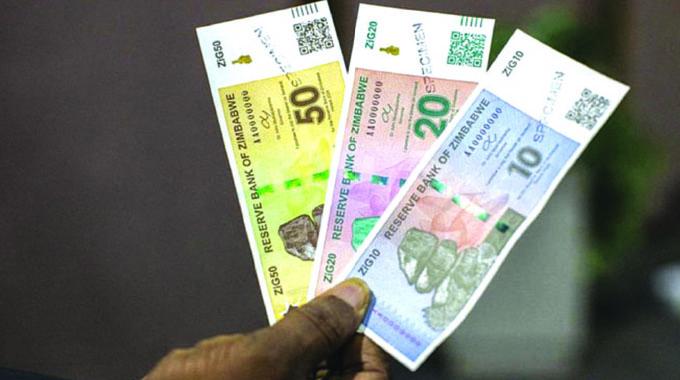News / National
ZiG inflation rate now pegged at 37.2%
26 Oct 2024 at 11:48hrs |
0 Views

Zimbabwe's inflation rate for the Zimbabwe Gold (ZWG) currency surged to 37.2% in October, according to the latest data from the Zimbabwe National Statistics Agency (Zimstat). This sharp increase, reflecting a substantial rise from September's 5.8%, is attributed to a rapid depreciation of the ZWG exchange rate, which the Reserve Bank of Zimbabwe (RBZ) recently devalued by 43% to align with market trends.
Presenting the data, Zimstat's Prices Statistics Manager, Thomas Chikadaya, highlighted that October's inflation represented a significant month-on-month shift. "The month-on-month inflation rate was 37.2 percent in October 2024, gaining 31.4 percentage points on the September 2024 rate of 5.8 percent," Chikadaya noted. "Prices, as measured by the all-items ZWG Consumer Price Index (CPI), increased by an average of 37.2 percent between September and October 2024."
October's inflation was primarily driven by Food and Non-Alcoholic Beverage costs, which contributed 15.5% to the overall inflation rate. As a result, month-on-month inflation for October climbed to 7.3%, a sharp increase from September's 1.9%.
In the midst of these shifts, monetary authorities remain cautiously optimistic. They believe the recent interventions could stabilize prices and curb volatility. Some major supermarkets have already begun to adjust their pricing structures to the revised official rate.
Meanwhile, the US dollar inflation rate in Zimbabwe remained relatively stable, with a month-on-month inflation rate of 0.7% in October 2024, unchanged from the previous month. The year-on-year inflation rate in USD terms was reported at 4.1% for October, with Food and Non-Alcoholic Beverages being the primary driver, contributing 0.5% to the monthly change.
At a recent CEO Roundtable, RBZ Deputy Governor Innocent Matshe addressed the business community's concerns over the fluctuating exchange rates. He urged executives to "exercise calm and accept market dynamics," reassuring them of the ZWG's durability despite current economic challenges.
"Make no mistake about the ZiG, it is here, and it is here to stay," Matshe said. "This currency is not like the RTGS or the Zimbabwe dollar we used to have. The starting point here is that the country is not facing a currency crisis."
The RBZ's interventions are expected to ease the inflationary pressures in the coming months.
Presenting the data, Zimstat's Prices Statistics Manager, Thomas Chikadaya, highlighted that October's inflation represented a significant month-on-month shift. "The month-on-month inflation rate was 37.2 percent in October 2024, gaining 31.4 percentage points on the September 2024 rate of 5.8 percent," Chikadaya noted. "Prices, as measured by the all-items ZWG Consumer Price Index (CPI), increased by an average of 37.2 percent between September and October 2024."
October's inflation was primarily driven by Food and Non-Alcoholic Beverage costs, which contributed 15.5% to the overall inflation rate. As a result, month-on-month inflation for October climbed to 7.3%, a sharp increase from September's 1.9%.
In the midst of these shifts, monetary authorities remain cautiously optimistic. They believe the recent interventions could stabilize prices and curb volatility. Some major supermarkets have already begun to adjust their pricing structures to the revised official rate.
Meanwhile, the US dollar inflation rate in Zimbabwe remained relatively stable, with a month-on-month inflation rate of 0.7% in October 2024, unchanged from the previous month. The year-on-year inflation rate in USD terms was reported at 4.1% for October, with Food and Non-Alcoholic Beverages being the primary driver, contributing 0.5% to the monthly change.
At a recent CEO Roundtable, RBZ Deputy Governor Innocent Matshe addressed the business community's concerns over the fluctuating exchange rates. He urged executives to "exercise calm and accept market dynamics," reassuring them of the ZWG's durability despite current economic challenges.
"Make no mistake about the ZiG, it is here, and it is here to stay," Matshe said. "This currency is not like the RTGS or the Zimbabwe dollar we used to have. The starting point here is that the country is not facing a currency crisis."
The RBZ's interventions are expected to ease the inflationary pressures in the coming months.
Source - NewZimbabwe
Join the discussion
Loading comments…




























